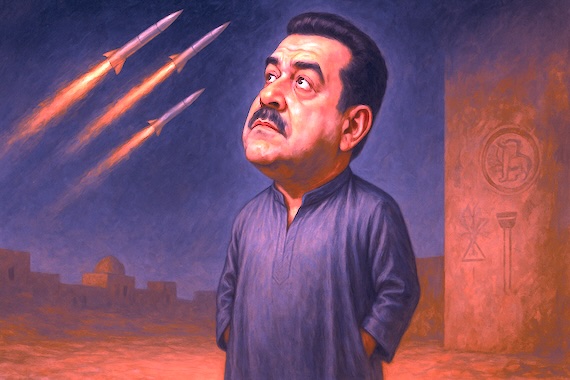Ann Arbor (Informed Comment) – The Israeli-Iranian War of 2025 has put Iraq in an extremely difficult situation. The country’s Shiite majority sympathizes with Iran and with the Palestinians, and resents Israel’s use of Iraqi airspace to attack their Shiite neighbor.
On Sunday the Iraqi Prime Minister Mohammed Shia al-Soudani met with Thomas Seiler, the European Union ambassador to Iraq. Al-Soudani said on that occasion that what he called “the recent Zionist aggression against the Islamic Republic of Iran” represents “a direct threat to security and stability in Iraq and the region.” He said Israel’s attack on Iran was intended to disrupt diplomacy and that it flagrantly violated international laws and norms.
Al-Soudani called on the major powers, and the European Union in particular, to bring a halt to these hostilities.
The Iraqi Prime Minister stated that Iraq registered the strongest possible objection to the Israeli violation of its airspace. He pointed out that Iraq had exercised restraint, in the interests of the Iraqi people, despite the tensions in the region caused by Israel’s ongoing genocidal war on the Palestinian people.
Meanwhile, Iranian President Masoud Pezeshkian called on Iraq to halt any further Israeli use of Iraqi air space.
Shiite Arabic-speakers make up some 60% of Iraq, while Sunni Kurds form on the order of 22%, with most of the rest being Sunni Arabs along with some small minorities. The government is in the hands of the Shiites, but they are themselves divided by party, region and social class.
Shiite hardliners close to Iran formed militias in 2014 to fight off the hyper-Sunni terrorist organization, ISIL (ISIS, Daesh). These militias, the “Popular Mobilization Forces,” created parties and have substantial representation in parliament and ties to mainstream Shiite parties. Over 60 such militant Shiite groups exist, with some 238,000 members, and the Iraqi parliament recognizes them as a sort of National Guard and gives them a budget of nearly $300,000 a year. Several of them are very close to the Iranian Revolutionary Guards Corps and say that they are glad to take orders from Ayatollah Ali Khamenei, Iran’s clerical leader.
Akram al-Kaabi, leader of the “Elect” (Nujaba’) militia, said that the Israeli attack on Iran was a signal that the American occupiers should be expelled entirely from Iraq. The Iraqi Party of God Brigades also demanded the removal of US troops from Iraq. The Badr Corps, a major Iraqi paramilitary that has some 17 seats in parliament, denounced the US for allowing Israel to fly over Iraq.
Several militias warned that if Washington directly intervenes against Iran on Israel’s behalf, they would respond by targeting American “interests and bases” in the region. As it is, they urged the closing of the US embassy in Baghdad.
The US does not have its own bases in Iraq anymore, but some 2500 US troops are hosted at Iraqi bases. In 2020 these bases were targeted by the Iraqi Shiite militias and by Iran after Trump assassinated a general leading the Iraqi Shiite militias as well as Qasem Soleimani, the then head of the Iranian Revolutionary Guards. There are some 40,000 US troops at bases in Kuwait, Qatar and elsewhere in the Gulf region, who are vulnerable to rocket attacks.
The Trump administration asked civilian dependents of US diplomatic and other personnel to leave Iraq last week, in advance of the Israeli attack on Iran. President Trump has threatened Iran with severe retaliation if it lashes out at American targets, and says he had nothing to do with Israel’s attack. His office even leaked that he vetoed an Israeli plot to kill Ayatollah Khamenei. It is not clear how he would respond to an attack on US troops by an Iraqi Shiite militia. In 2020 he had the US Air Force bomb known Iraqi Shiite militia bases, but this campaign was riddled with errors and had no significant military or political impact.

“Al-Soudani,” Digital, ChatGPT, 2025
In January of this year, the Shiite militias pledged to cease attacking the Iraqi bases hosting US troops if Prime Minister al-Soudani would work quickly to see that the US troop presence in the country was ended.
Prime Minister al-Soudani wants good relations with the Trump administration, and so is unlikely to take any practical steps in defense of Iran, but he is under severe pressure from Shiite hardliners. Asking the US to pull out its remaining troops might be one symbolic measure he could take, but he and other mainstream politicians view the small American presence as a deterrent to any return of ISIL (the remaining members of which are delighted by the Israeli attack on Tehran).


 © 2026 All Rights Reserved
© 2026 All Rights Reserved